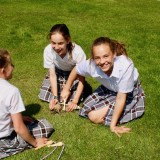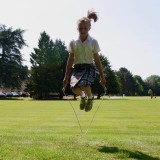Kevin Smith, Head of Boys' Sport, observes the children during their break time.
As a teacher on duty at break times, I observe the children as they play in our grounds. Especially in this summer term, the fields and lawns are awash with groups of children involved all manner of games: tennis - both on the courts and against the Main House, rounders, cricket, bowling and batting practice in the nets, as well as roller skating, den building in the boundaries and of course the enduring traditional playtime games.
Considering I spend much of my time, as a sports coach, organising children, applying rules and making calls on fair play, I am genuinely pleased to remind myself that children play so naturally together. I have thoroughly enjoyed standing back and watching them learn.
- Left to their own devices children are more than capable of organising themselves and I can hear the children planning out their own rules - they don't need the official ones!
- I think there is more give and take than many adults would give children credit for. I definitely see the children’s morals and values shining through.
- I am often surprised how well they communicate as they discuss problems and make decisions as a group. It is good to see children working on these all-important social skills.
- I have witnessed much resilience and perseverance from the losing team, despite the fact they could choose to walk away.
- It is brilliant to see children tap into their creativity in a way they may not do in lesson time.
As I have mentioned previously, when we run around and play games, neurochemicals are released that build self-esteem, attention span, working memory, information processing speed and feel-good factor, all of which effectively aid learning. These positives, combined with the social and behavioural element of free play, give extra meaning and importance to playtimes in the school day.






